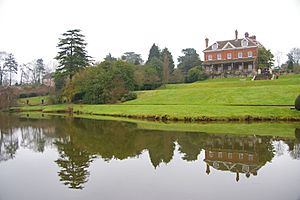Charles Caesar (Treasurer of the Navy) facts for kids
Charles Caesar (born November 21, 1673 – died April 2, 1741) was an important person from Benington, Hertfordshire, England. He was a politician, a lawyer, and belonged to the Tory party. He also supported the Jacobite cause, which meant he wanted a different royal family to rule Britain.
Contents
Early Life and Education
Charles Caesar was the son of Sir Charles Caesar. He studied at St Catharine's College, Cambridge and later became a lawyer at the Middle Temple in 1690. When his father passed away in 1694, Charles inherited the family estate in Benington.
Political Career
Becoming a Member of Parliament
Charles Caesar first became a Member of Parliament (MP) in 1701. He represented the town of Hertford. His family had a lot of influence there. However, there were often arguments about who could vote in Hertford. These arguments meant that almost every election ended with a complaint to the government. Decisions were often made based on which political group was stronger, not always on what was fair.
In 1708, Charles Caesar lost an election to Sir Thomas Clarke. He complained about the result but later dropped his complaint.
Important Roles in Government
Charles Caesar won his seat back in 1710. He served as the Treasurer of the Navy from 1711 to 1714. This was an important job where he managed money for the navy. He lost this job when a new royal family, the Hanoverians, came to power.
In the 1715 election, Charles Caesar was re-elected for Hertford. However, his opponents, including Sir Thomas Clarke, complained that he had used unfair methods to win. As a result, his election was cancelled.
Staying Active in Politics
Even when he was not in Parliament, Charles Caesar stayed active in politics. He was a close friend of the Earl of Oxford. Charles Caesar even helped the Earl try to get support from Charles XII of Sweden for the Jacobite cause. This cause aimed to bring a different royal family back to the throne.
In the 1722 election, Charles Caesar's election was again overturned. He only served for a few months before Sir Thomas Clarke was declared the winner instead. After these setbacks, Charles Caesar decided to run for MP for the whole county of Hertfordshire. He served as Hertfordshire's MP for most of the rest of his life.
Private Life
Charles Caesar passed away in 1741. He had faced some money problems. He had built a new house in Benington, but it sadly burned down soon after it was finished.
In 1702, he married Mary Freman. They had two sons and two daughters. After his death, the Benington estate was sold in 1744. Most of the money went to his eldest son, also named Charles, to help him start a new family home.
 | Janet Taylor Pickett |
 | Synthia Saint James |
 | Howardena Pindell |
 | Faith Ringgold |


